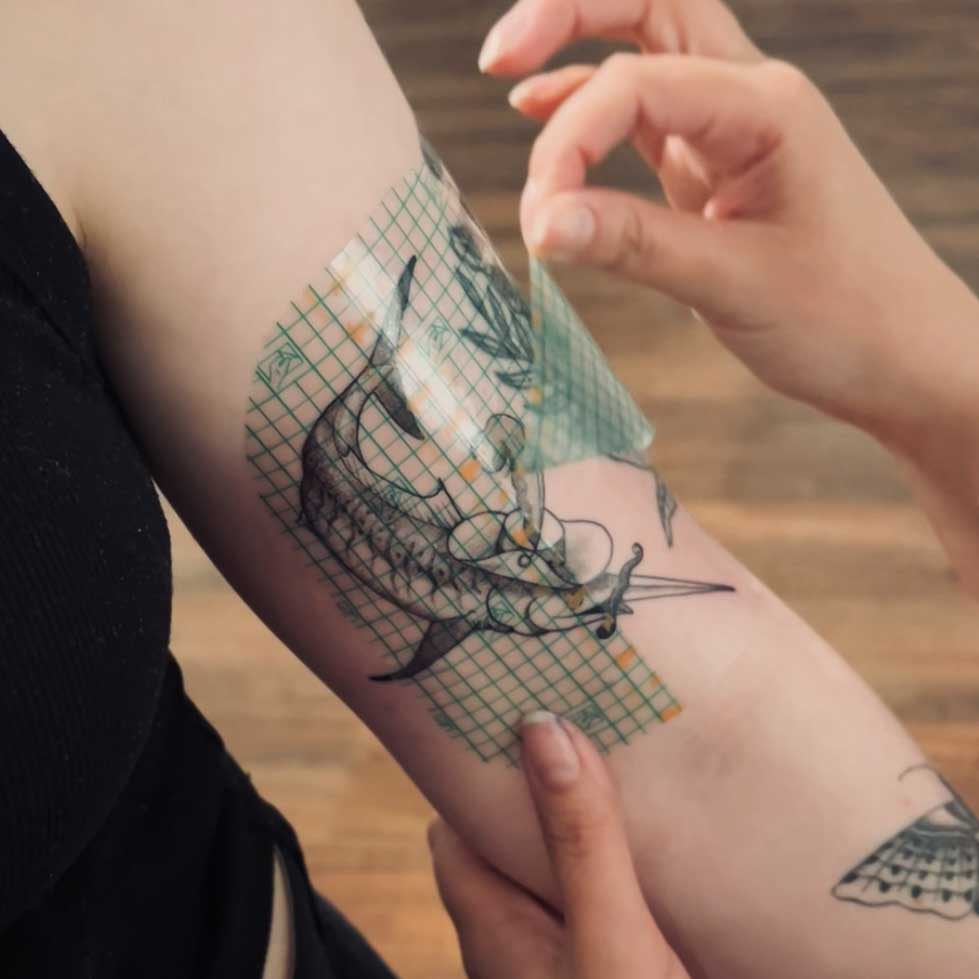
At BlackBear Ink, we take the long-term integrity of your tattoo very seriously. We want your ink to look just as stunning on your last day (and beyond) as it did on day one.
As seasoned professionals (who have also made these mistakes, even the artists), we’ve put together a list of the most common mistakes during tattoo healing. And more importantly, how to avoid them.
Scratching or rubbing your new tattoo, especially in the first week, can damage the top layers of skin. This can seriously delay the tattoo healing process; it may even cause the ink to fade or distort.
What to do:
If it itches (and it will 🥲), gently pat around the tattoo with a clean cloth or apply a mild, fragrance-free moisturizer to soothe the skin. Nighttime scratcher? As odd as it sounds, try sleeping with socks or gloves on your hands during those first few nights.
🖤 At BlackBear Ink, you can schedule a free touch-up within three months. Check the rules for touch-ups here.
Sun = enemy number one for a fresh tattoo. UV exposure can fade your tattoo’s colors and damage the healing skin.
What to do:
Stay out of direct sunlight until the tattoo is fully healed; we recommend at least 30 days. After that, sunscreen (minimum SPF 30) becomes your lifelong best friend. Seriously, forever. No exceptions.
💡 Our motto: sunscreen until you die. You’ll thank us later.
Moisturizing is crucial, but overdoing it can clog your pores, disrupt healing, and increase the risk of infection.
What to do:
Apply a thin layer of ointment or cream. Your skin shouldn’t look greasy, but it shouldn’t feel tight or dry either. You can continue using the cream even after the tattoo has healed.
If you don’t clean your tattoo correctly, dirt and bacteria can accumulate and lead to infection.
What to do:
Wash the tattoo gently with lukewarm water and a fragrance-free, mild soap (available at BlackBear Ink). Pat dry with a clean towel and always follow your artist’s aftercare instructions.
We get it — movement is medicine. But excessive sweating and friction can disrupt the healing process of your tattoo, especially in the first two weeks.
What to do:
Avoid heavy workouts or intense physical activity for the first two weeks (longer if your tattoo is large). Also, absolutely no swimming (not in pools, not in the sea) for the first 20 days.
Keeping your wrap or Second Skin or foil on too long can cause the tattoo to overheat and trap bacteria, slowing down the healing process.
What to do:
Remove the Second Skin or foil exactly as your tattoo artist advised. More time does not always equal better healing.
Soaking your tattoo (even in “clean” water) can break down healing skin and ink, especially in the early days.
What to do:
Avoid swimming in public pools, baths, or oceans during the first few weeks. Showers are fine, but keep it short and don’t let water hit the tattoo directly.
Tight clothes and scratchy fabrics (like wool) can irritate your new tattoo and cause friction that slows healing.
What to do:
Wear loose, breathable, and clean clothing that doesn’t touch the tattooed area. Bonus: this also reduces the risk of bacterial infection.
Infections can seriously damage your tattoo and even cause long-term skin issues.
What to do:
If your tattoo becomes very red, swollen, painful, or if you notice pus or fever, contact your tattoo artist or a medical professional immediately.
The healing process of a tattoo is just as important as the tattoo session itself. Take your time, treat your skin right, and avoid these common mistakes. Your tattoo will thank you- for life.
share